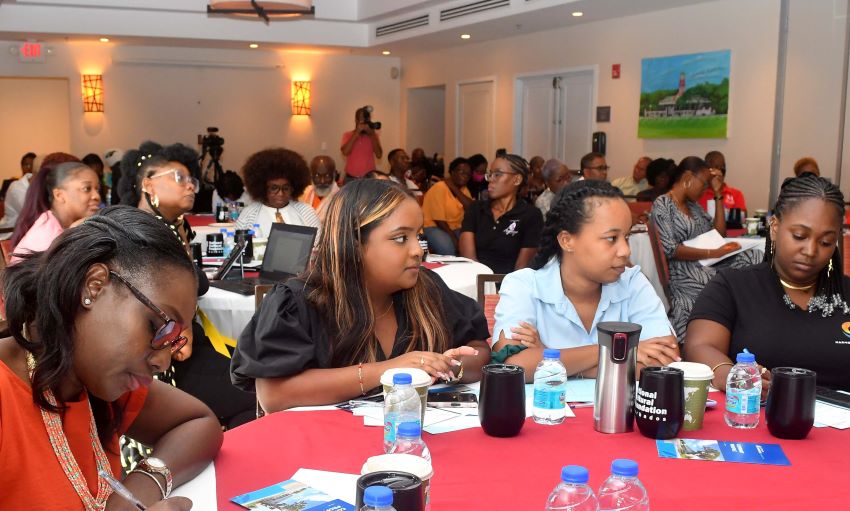BY PUBLIC RELATIONS | JAN 18, 2023
Caribbean Export’s trade expert and attorney-at-law, Sonja Allyson Francis, speaking at the NCF’s recent Accelerate to Export Symposium. (NCF)
Navigating the rules of engagement when trading with other countries was the focus of the National Cultural Foundation’s (NCF) most recent Accelerate to Export Symposium.
Staged in association with Export Barbados and the Caribbean Export Development Agency (Caribbean Export) at the Courtyard by Marriott, the symposium targeted creatives involved in beauty, spa and wellness, the home and accents segment, as well as fashion and accessories.
The aim was to prepare these enterprises for the export market, and the sessions, hosted by the NCF’s Business Development Department, exposed participants to foundational requirements for exporting, including quality and standards, market research and trends, logistics and shipping, scaling of production, legal matters, e-commerce, and partnerships.
One of those sessions, themed What’s Trending? Market Research and Trends, was facilitated by trade expert and attorney-at-law Sonja Allyson Francis, who works with the Barbados-based regional agency, Caribbean Export.
Francis, who served as a trade and investment specialist with the Economic Partnership Agreement (EPA) Implementation Unit of CARIFORUM (CARICOM and the Dominican Republic), took the micro and small enterprise (MSE) owners through some of the key aspects of international trade that impact their ability to move products and services into markets like the European Union.
Francis paid particular attention to matters related to rules of origin, as the EPA, which Barbados and other CARICOM members signed, provides generous duty-free access arrangements for goods produced in the region or with inputs from African, Caribbean and Pacific (ACP) countries.
“When you go to trade shows, people often ask entrepreneurs how do you source and sustain your products, and this ties into the European rules of origin…. This also helps your competitiveness, as your product can enter the market at a much lower price, duty-free and quota free,” she outlined.
At the same time, the business owners were told that among the prerequisites for duty-free and quota-free access to the EU under the EPA was conformation to rules of origin.

She drew an example where apparel or soft furnishings may be produced in Barbados, but the fabric and other inputs sourced from an African nation. In such instances, she explained, the Barbadian product would still meet the rules of origin standard but exported under a different tariff heading.
In addition, she advised them of the importance of the HS Code (the Harmonised System, which is a standardised numerical method of classifying traded products).
Francis told the cultural industries entrepreneurs that even in cases where they used imported products and undertook “substantial transformation” of that product in Barbados, it could be legally re-exported as an authentic Barbadian product and access the EU market with the accompanying trade benefits.
Addressing the matter of capacity and economies of scale for micro and small enterprises, the trade expert suggested use of joint ventures, particularly for service providers.
“You can digitise your design and someone else can do the manufacturing. When you come up with a design, you don’t have to take it through to the end of the value chain; you can stop and negotiate where you can make your money. You can design the jewellery, for example, and have someone make the jewellery for you,” the Caribbean Export official disclosed.
For more information on the National Cultural Foundation’s programmes to assist small and micro businesses in the cultural and creative industries, contact the Business Development Department at 417-6649, or email info@ncf.bb.




